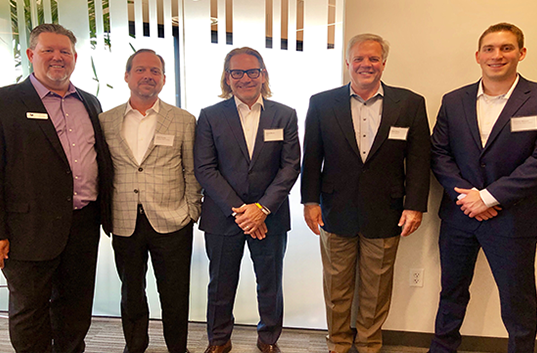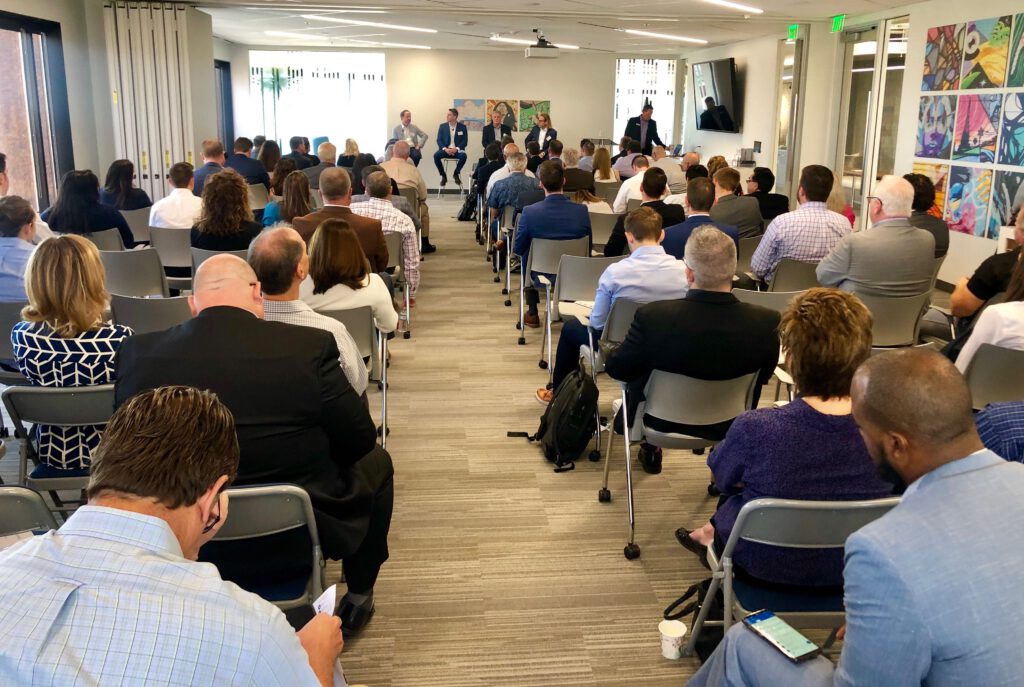

Industry experts tout data center growth in Greater Phoenix
Published: 05/22/2019
Updated: 04/11/2024
Greater Phoenix continues to become a hotspot for data center development and success. While the region is positioned for growth, it still competes with six other major data center markets including Atlanta, Chicago, Dallas/Fort Worth, the New York tri-state area, Northern Virginia and Silicon Valley. Leadership throughout Greater Phoenix are advancing ways to ensure that the region transitions from an emerging data center market to a mature primary data center market.
The Greater Phoenix Economic Council (GPEC) held an Ambassador panel featuring industry experts who discussed why companies are choosing Greater Phoenix for data center development. The panel also provided information about environmentally conscious approaches to data center cooling and an overview of the economic benefits the region provides to current and prospective data center companies.
The panelists included Mark Bauer, managing director and co-leader of JLL’s global Data Center Solutions group; Chris Curtis, co-founder and senior vice present of development and acquisitions of Compass Datacenters; Scott Davis, CEO and president of Forced Physics; and Jeremy Myers, the director of real estate of EdgeCore. The panel was moderated by Brad Smidt, GPEC’s senior vice president of business development, with more than 80 attendees in the audience for an informative and interactive discussion.
Why are companies choosing Greater Phoenix for data centers?
The region currently has an impressive number of data centers in planning stages, production and use, including Iron Mountain, Microsoft, Stream Data Centers and more. The panelists presented many reasons why companies are choosing to open data centers in Greater Phoenix.
Jeremy Meyers said EdgeCore was attracted to expand their data center campus to Mesa due to the tax incentives, power rates, available labor pool and low construction costs as well as the robust infrastructure available along the west coast. Chris Curtis mentioned that Compass Datacenters spent time looking at other cities before coming to Greater Phoenix and discovered that cities outside Arizona had too many risks, not enough land and expensive power. Curtis found that Arizona was the best choice because the state provides a competitive tax incentive, and he was impressed by the professionalism of SRP and APS as well as their proactive investing in future technology.
“This region is a great place to live and have a business,” Scott Davis said.
He further explained that “the reason we moved here is because with our technology, we can cool the electronics in data centers using only filtered outside air in Phoenix and no water. We look at this as a way to demonstrate the technology and also show that Phoenix is the place to have a mecca of data centers.”
The panelists also mentioned that the ability to get the data closer the customer, also referred to as “the edge,” is important when developing data centers. When considering proximity and transport in Greater Phoenix, Curtis pointed to the region’s “very geographically disperse market,” and ability to benefit from the region’s improving infrastructure.
How do developing data centers benefit Greater Phoenix?
Bauer said that due to the region’s quality workforce and educated population, Greater Phoenix has created a good quality of life and is a top market for data center growth.
“When Ebay and PayPal came to town in 2006, they came with their data center and they have over 3,500 employees here and over 1,000 of them are high-paying engineers,” Bauer said.
Meyers highlighted the jobs available at data centers from onsite staff, utility, maintenance as well as the employment that is needed to accommodate tours given at data centers.
Curtis pointed to the thousands of construction jobs data center development creates including the need for professional electricians and mechanical engineers.
“The great story about data centers is that it is a huge tax revenue and we spend a lot of money on infrastructure that benefits the community,” Curtis said. “Now, the West Valley will have much better internet than they used to have because of all the fibers data centers are bringing.”
In the audience, JD Beatty, the City of Mesa’s project manager, pointed out how Mesa’s economy has specifically benefitted from data center development in Greater Phoenix.
“One critical piece is the sales tax on electricity,” Beatty said. “About 107 megawatts in Mesa equates to about a $250,000 in direct city revenue for electricity sales tax alone. Our city management found that we can use this money to build fire stations in new areas of Mesa and build streetscape projects that we wouldn’t have thought we could fund before. There are a lot of direct community benefits driven by the electricity sales tax.”
What will data center technology in the region look like in three or more years?
The panelists said they are hopeful that data center growth in Greater Phoenix will advance in the next few years. Curtis said that the success of data centers relies on their environment to grow and flourish, and for Greater Phoenix to continue as a competitive market.
In Greater Phoenix’s near future, additional providers will likely enter the market creating increased competition and fiber providers will continue to proactively lay fiber throughout the market. With the approach of 5G technology, data centers will need to be closer to users for reduced latency and will need to update their infrastructure to handle these new high volumes. Verizon recently announced that Phoenix will be one of the first U.S. markets to receive their 5G network, promising faster mobile speeds paving the way for autonomous vehicles, consumer applications and more. As Phoenix becomes one of the first cities to adopt 5G technology, this sets the region apart from other top data center markets and will continue position Greater Phoenix as a top tech hub.
Are you interested in investing in all aspects of Greater Phoenix to advance our region as a top tech market? Become an Ambassador – learn more.
